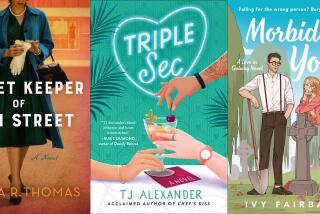A Fairy Tale for Grown-Ups : THE REPUBLIC OF LOVE, <i> By Carol Shields (Viking: $22; 327 pp.)</i>
- Share via
“What does it mean,” asks one of the characters early on in Carol Shields’ “The Republic of Love,” “to be a romantic in the last decade of the twentieth century?”--and this is a question that is much discussed, always entertainingly if not always credibly, throughout this love story of two not quite middle-aged urbanites.
When we first meet Tom and Fay they are unattached. Tom, a 40-year-old late-night disc jockey, has been married three times; Fay, a 35-year-old anthropologist writing a book on mermaids, never. When the book opens, they do not know each other, although they live on the same street in Winnipeg, and for the first half of the book we see them, in alternate chapters, going through their separate lives, working, dealing with friends and family, remembering old relationships, reflecting on what it means to be both in love and out of it, wondering whether they will ever be in love again.
This first section is the book’s triumph. Shields has brought fully, richly to life two whole separate social circles, each including everyone from passing acquaintances to old friends, family members and former lovers, all drawn with a lightness that belies great skill. She has even done the all-but-impossible and described their “in” jokes without being either clumsy or embarrassing.
Shields’ joyfulness, her often faintly malicious wit, is counterbalanced with both Fay and Tom’s more somber musings on the single state, the creeping isolation, the panicky compulsion to have every evening filled, the occasional, desperate sexual encounters, the wondering whether in a year’s time they will “still be bluffing along, hearty and brave, posing questions, boarding buses, attending showers, buying hospitality gifts, writing thank-you notes, and trying not to get too mouthy and mean.” Underlying all, of course, is the tension in wondering just when the two will meet--since they cleverly will--and just how these two people, whom we have come to know so well, will react to each other when they do meet.
But it is precisely when they are brought togethher that the book, sadly, begins to fall apart just a little. It would be unfair to give away exactly what happens, but suddenly, in this hitherto beautifully realized novel, a selection of people, young and old, start to fall in and out of love with all the carefully thought-out motivation of sitcom characters. Tom, veteran of three marriages, is shocked and hurt--and we are invited to sympathize with him--when his coarser friends josh him about a planned fourth. Fay bows out of the love affair of her life because, as she explains blithely, “I can’t commit.” The reader’s disappointment is sharp. It is as if the author, having allowed her characters to grow and develop independently, has suddenly and arbitrarily decided, No--they shall not act thus, and thus, and thus; and she inevitably diminishes them in the process.
All is by no means lost, however. If--granted, it is not a small if --you can suspend your disbelief for the second half of the book, there are some rich rewards. There is the slyly amusing realization by an urban sophisticate, newly in love, that the only vocabulary she has to express her state comes from hokey rhymes in greeting cards. There is an elderly man, newly separated from his wife, living in a heartbreakingly ugly apartment, and his daughter wondering “how on earth he’d chosen such a terrible place.” There are sudden lyrical outbursts on the nature of love--it is a republic, not a kingdom, Shields suggests, where everyone gets a turn sometime. There are equally poignant evocations of the lack of love. There is much that is true here, and much that is good; it is perhaps mealy-mouthed to complain that the characters around whom the story is woven are no longer quite as convincing as they were.
What does it mean, asks Fay, to be a romantic in the last decade of the 20th Century? Her brother Clyde gives the answer. “ ‘To believe anything can happen to us,’ he said, and gave her a look.” It is easy to complain that Shields is facile in suggesting that absolutely anything might happen to us, that a grown-up fairy tale is a slight to a grown-up’s intelligence, a contradiction in terms. But the fact is that what Shields has given us, whether it all hangs together or not, is nevertheless a good book. At times, it is a very good book indeed.
More to Read
Sign up for our Book Club newsletter
Get the latest news, events and more from the Los Angeles Times Book Club, and help us get L.A. reading and talking.
You may occasionally receive promotional content from the Los Angeles Times.






